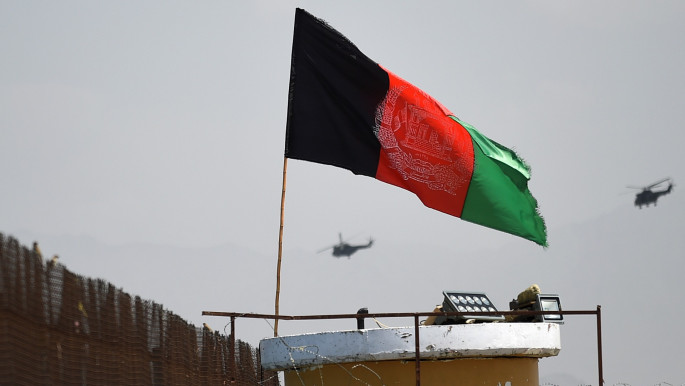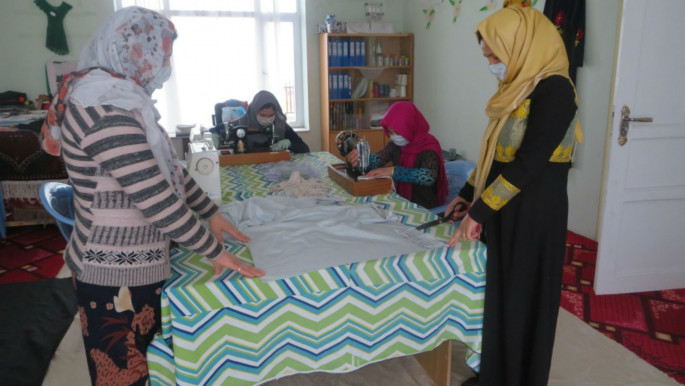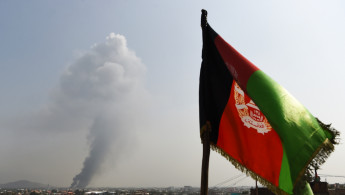Pandemic and violence jeopardise Afghanistan's fragile peace process
Amid the dual crisis, a power-sharing deal was signed this week between Afghanistan's President Ashraf Ghani and his rival Abdullah Abdullah, offering a glimmer of hope.
The deal ended months of political uncertainty after both Ghani and Abdullah claimed victory in last September's presidential election and held rival inauguration ceremonies last month. Under the deal, Ghani will stay on as president while Abdullah will lead intra-Afghan talks with the Taliban.
The power-sharing deal came just days after a brutal attack on a maternity ward in Kabul that killed 24 people on 12 May. The callousness of the attack shocked the world, as terrorists targeted new-born babies, mothers and nurses.
Though the Taliban denied any involvement in the attack, the Afghan government held them responsible and ordered a military operation targeting the militants.
 |
|
| Read more: Winners and losers: The future of Afghanistan's fragile peace process |
On the same day, a suicide bomber targeted a funeral in the eastern province of Nangarhar, with the Islamic State claiming responsibility for the attack. No group, however, claimed responsibility for attacking the Kabul maternity ward, including IS. The US, however, held the extremist group responsible.
Whoever the mastermind of the attack was, one thing is clear: it was designed to sabotage the US-Taliban peace deal to end the conflict in Afghanistan.
The Taliban, for example, took Kabul's offensive operations as a "declaration of war" and carried out a suicide bombing on 14 May targeting a military compound that killed five people and injured at least 29 others in Afghanistan's eastern Paktia province.
Yet despite this, violence and the Covid-19 pandemic - both emerging national challenges – have actually brought Afghan President Ashraf Ghani and his rival Abdullah Abdullah to the negotiating table to resolve the feud.
Amid the flaring violence, the US has also declared that it will continue its drawdown of troops from Afghanistan and pledged to meet a timeline that had been agreed upon with the Taliban earlier this year. The statement from the US came after the 12 May attacks.
It also declared that all foreign forces are supposed to withdraw by the end of the second quarter next year. US officials said they would reduce to 8,600 troops by 15 July, and abandon five bases in Afghanistan.
 |
While the Covid-19 pandemic has threatened a health disaster in Afghanistan, growing violence has also jeopardised US-led peace efforts in the war-wracked country |  |
Politically, it suits US President Donald Trump to bring troops back home from Afghanistan before presidential elections in November this year, a promise Trump had made during his electoral campaign in 2016.
But there are also other reasons for the US to continue its troop withdrawal. Firstly, the pandemic has provided a strong reason for the Trump administration to expedite the pull-out. Secondly, Washington has conveyed to spoilers trying to disrupt the peace process that the US is committed to ending its longest war following the peace deal it signed in Qatar.
Critics, meanwhile, accuse the US of withdrawing without paying sufficient attention to the spike in terror attacks, and label the US-Taliban agreement a 'withdrawal' rather than 'peace' deal.
 |
|
|
Read more: Escaping the shadow pandemic of gender-based violence |
Indeed, following the signing of the peace deal with the US, the Taliban stepped up attacks on Afghan security forces. In an open letter to the Taliban on 2 May, the US military in Afghanistan urged warring parties to "return to the political path" as a surge in violence risked shattering the nascent peace process.
The impact of Covid-19
Amid the spike in violence, the outbreak of the Covid-19 pandemic has threatened a humanitarian disaster in Afghanistan, whose depleted healthcare system is unable to cope.
"Afghanistan's numerous and, in some cases, unique vulnerabilities - a weak healthcare system, widespread malnutrition, porous borders, massive internal displacement, contiguity with Iran, and ongoing conflict - make it likely the country will confront a health disaster in the coming months," a report released by Special Inspector General for Afghanistan Reconstruction (SIGAR) John Sopko said.
The pandemic has also created an emergency for the implementation of the prisoner swap deal, a key part of the US-Taliban peace agreement. As Covid-19 infections increase, it is feared they could spread to prisoners under the custody of either the Afghan government or the Taliban.
 |
Amid the dual crisis, a power-sharing deal was signed this week between Afghanistan's President Ashraf Ghani and his rival Abdullah Abdullah, offering a glimmer of hope |  |
If a large number of prisoners on both sides die from the virus, it could spark a blame game between Afghan officials and Taliban militants, and ultimately plague US-led efforts. As a result, the US has pressed the Taliban and Afghan president Ghani to expedite the prisoners exchange and free thousands of at-risk prisoners as a precursor to peace talks.
Both the coronavirus and recent deadly violence are a wake-up call for the warring parties in Afghanistan. The prospects are bright for the success of the peace process if sanity prevails and all Afghan stakeholders resolve their disputes amicably to save their country. This is a poignant and decisive moment in Afghanistan's history.
Syed Fazl-e-Haider is a contributing analyst at South Asia desk of Wikistrat. He is a freelance columnist and the author of several books including the 'Economic Development of Balochistan'



